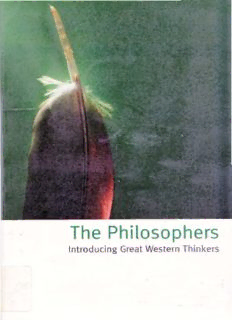
The Philosophers - Introducing Great Western Thinkers PDF
Preview The Philosophers - Introducing Great Western Thinkers
The Philosophers Introducing Great Western Thinkers THE PHILOSOPHERS TedHonderichretiredin1998fromtheGrote Professorshipofthe PhilosophyofMindand LogicatUniversityCollegeLondon.Heisthe editorofTheOxfordCompaniontoPhilosophy (1995),from whichthepiecesinthisbookare taken;itwasdescribedbytheObserveras'that rarestofthings:aphilosophicalworkthatis genuinelyentertaining...byfarthebest-and bestvalue-philosophicalreferencebookon themarket'. THE PHILOSOPHERS INTRODUCING GREAT WESTERN THINKERS Editedby TED HONDERICH OXFORD UNIVERSITYPRESS OXFORD UNIVERSITYPRESS GreatClarendonStreet,OxfordOX26up OxfordUniversityPressisadepartmentoftheUniversityofOxford. ItfurtherstheUniversity'sobjectiveofexcellenceinresearch,scholarship, andeducationbypublishingworldwidein Oxford NewYork Athens Auckland BangkokBogota BuenosAires Calcutta CapeTown Chenoai DaresSalaam Delhi Florence HongKong Istanbul Karachi KualaLumpurMadrid Melbourne MexicoCity Mumhai Nairobi Paris SaoPaulo Shanghai Singapore Taipei Tokyo TorontoWarsaw withassociatedcompaniesin Berlin Ihadan OxfordisaregisteredtrademarkofOxfordUniversityPress intheUKandincertainothercountries PublishedintheUnitedStates byOxfordUniversityPressInc.,Nev.'York ,:&;:,OxfordUniversityPress1995,1999 Originallypublishedin'fluOxfordCampanian10Phiwsophy,1995 Themoralrightsoftheauthorhavebeenasserted DatabaserightOxfordUniversityPress(maker) Firstpublished1999 FirstpublishedasanOxfordUniversityPressPapetback2001 Allrightsreserved.Nopartofthispublicationmaybereproduced, storedinaretrievalsystem,ortransmitted,inanyformorbyanymeans, withoutthepriorpermissioninwritingofOxfordUniversityPress, orasexpresslypermittedbylaw,orundertermsagreedwiththeappropriate reprographicsrightsorganization.Enquiriesconcerningreproduction outsidethescopeoftheaboveshouldbesenttotheRightsDepartment, OxfordUniversityPress,attheaddressabove Youmustnotcirculatethisbookinanyotherbindingorcover andyoumustimposethissameconditiononanyacquirer BritishLibraryCataloguinginPublicationData Dataavailable LibraryofCongressCataloginginPublicationData Thephilosophers:introducinggreatwesternthinkers!editedbyTedHonderich. Includesbibliographicalreferencesandindex 1.Philosophy_History. 2.Philosophers-History I.Honderich, Ted. II.Oxfordcompaniontophilosophy: B72.P44 1999 190~dc21 98-54768 ISBN0-19-823861--4 (cased) ISBN0-19-285418-6 (paperback) 10987654321 PrintedinGreatBritain onacid-freepaperby CoxandWymanLtd.,Reading CONTENTS LISTOFCONTRIBUTORS vi INTRODUCTION TedHonderich SOCRATES C.C.W. Taylor 9 PLATO DavidBostock 15 ARISTOTLE DavidCharles 23 AUGUSTINE ChristopherKirwan 33 AQUINAS AlexanderBroadie 39 HOBBES BernardGert 49 DESCARTES johnCottingham 59 SPINOZA T.L.S.Sprigge 67 LOCKE RogerWoolhouse 77 LEIBNIZ R.C.Sleigh,jr. 87 BERKELEY GeoffieyWarnock 95 HUME justinBroackes !O3 KANT HenryE.Allison II5 BENTHAM RossHarrison 123 HEGEL PeterSinger 131 SCHOPENHAUER T.L.S.Sprigge 139 KIERKEGAARD AlastairHannay 149 MILL johnSkorupski 157 MARX AllenWood 167 NIETZSCHE RichardSchacht 175 PEIRCE c.].Hookway 187 JAMES T.L.S.Sprigge 197 FREGE AnthonyKenny 203 HUSSERL M.].Inwood 2II RUSSELL MarkSainsbury 217 WITTGENSTEIN PeterHacker 225 HEIDEGGER M.j.Inwood 235 SARTRE ThomasBaldwin 245 CHRONOLOGICALTABLE A.R.Lacey 253 GUIDETOFURTHERREADING 265 INDEX 281 LIST OF CONTRIBUTORS HenryE.Allison,BostonUniversity ThomasBaldwin,UniversityofYork DavidBostock,UniversityofOxford JustinBroackes,BrownUniversity AlexanderBroadie,UniversityofGlasgow DavidCharles,UniversityofOxford JohnCottingham,UniversityofReading BernardGert,DartmouthCollege,NewHampshire PeterHacker,UniversityofOxford AlastairHannay,UniversityofOslo RossHarrison,UniversityofCambridge TedHonderich,University CollegeLondon c.].Hookway,UniversityofSheffield M.].Inwood,UniversityofOxford AnthonyKenny,UniversityofOxford ChristopherKirwan,UniversityofOxford A.R.Lacey,King'sCollegeLondon. MarkSainsbury,King'sCollegeLondon RichardSchacht,UniversityofIllinois,Urbana-Champaign PeterSinger,MonashUniversity JohnSkorupski,UniversityofStAndrews R.C.Sleigh,Jr.,UniversityofMassachusetts,Amherst T.L.S.Sprigge,UniversityofEdinburgh C.C.W.Taylor,UniversityofOxford GeoffreyWarnock,lateoftheUniversityofOxford AllenWood,YaleUniversity RogerWoolhouse,UniversityofYork INTRODUCTION TED HONDERICH I N thefirstphilosophyofwhichwehavemorethanfragments, there wasthearguerwhodidnotgiveup,Socrates.Ofhimitispossibleto think that he stubbornly chose to die in order to bring home to his accuserstheerroroftheirways,toshowthemtheywerewrongabout him.Histakingthehemlockin399Bemadehimasimmortalasanyofus are.Asforhisthoughts,theycannotbeseparatedwithconfidencefrom those ofhispupil Plato,both havingbeenwritteninto thelatter'sdia logues.ButwhatevertheoriginsofPlato'sthoughts,thoseofhismiddle periodhadtodowiththeordinaryworldinwhichweliveandalsowith somethingelse,truerealiry. Our ordinary world, he suggested, is like a parade of indistinct shadowslookedatbycaptivesinacave.Truerealityiswhatbycontrast is not approximate or transient. True reality consists in perfect and eternaltypesofthings,notimperfectandpassinginstancesorexamples ofthem. True realityisthe Forms orIdeas, aboveallthe Form ofthe Good,butalsotheFormsofHorseandChairandthelike. Thesemust existtogiveourwordstheirmeanings.Theyarenotinthecavebutinthe sunlightoutside,existingtherewhetherornotthereareshadowsinthe cavethatweaklyresemblethem.Onlyafewofus,thephilosophers,ever get out into the light. Through all ofthis doctrine, somehow, Plato attemptsanswersto thelargequestionsofhowallthingsare, andhow thingsshouldbe;andwhoshouldrule,andhowweknowwhatwedoof thesevariousmatters. AccordingtoJean-Paul Sartre in1945, each ofus freely chooses the personweare.Wemaypretendotherwise,likethewaiterhidinginhis apronedrole,orthegirlleavingaman'shandonherknee.Butinfactwe wholly creatively make our existence what it is. We are absolutely responsibleforallofit.Wemakeouressences.Thispieceofbraveryin philosophy, though Sartre later had the sense to think better ofit, broughtExistentialismtothefrontofthesubject. Thepropositionofourabsolutefreedomispartofastoryoftheordin aryworldabsolutelyunrelatedtoPlato's. Itisnotamarterofshadows inacaveoroflightoutside.Allthatisfiction,oranywaytobeshrugged offonone'swayuptheruedelaSorbonne.Sartregivesanswerstodiffer entquestions,whichwearetoseearetherightquestions,thequestions thatcanyieldtruthorimportanttruth. Hisannouncementofthefalse hoodofdetenninismisbynomeansallofhisthinking,oritsconclusion, butan exemplarofit. It helped, as did his Left-Wingpolitics, to bring 50,000oftheFrenchtohisfuneral. The distance betweenthe philosophyofSocrates andPlato and the philosophyofSartreisnotonlyaresultofthe24centuriesbetweenthem. ConsiderHeidegger,nearlycontemporarywithSartre.Thephilosophy ofthis German, despite including items that can bring to mind the philosophiesofbothPlatoandSartre,isalongwayawayfrombothof them. OnepartoftheconcernofhislargeworkBeingandTimeisallof beingoris-ness, Sein. Itisto beapproachedbywayofa consideration ofone part ortype ofbeing. This isbeing-there orperhaps beings or man-Dasein. Asyoumightexpect,Daseininitselfisasubjectthatrequiresagood dealofattention.Whatisthenatureofitsconsciousnessorawarenessor, asissaid,itsoriginaldiscourse?Whatisthenature,ifthisisnottospeak too plainly, oftheconsciousnessofus? Itisnotamatterofdescriptive truths,ofcorrespondencetofact. Itisnotamatterofsuchitemsas'This hammeris heavy', but ofsuch exclamations and instructions as 'Too heavy! Give me alighterone'~whichphilosophicalthought certainly predated a similar one at the beginningofWittgenstein's Philosophical Investigations. Heidegger,whoserelationto Nazismistakenbysometo bealittleobscure,andwhosaidforseveralreasonsthat'sciencedoesnot think',isputaboveSartrebymanyofthosewhorankgreatphilosophers. Butmyconcernisonlytogivesomeindicationofthegulfbetweenthem. There is another gulfbetween each ofSartre and Heidegger and anotheroftheirnear-contemporaries,BertrandRussell. Anexemplarof hisphilosophy,indeedtheexemplar,isatbottomapieceofphilosophyof language. Itis one thatdoesindeedpresupposethat whatissomehow fundamental in our relationship to the worldis fact-stating discourse. Givinginstructionsandthelikeisdependentonsomethingelse-seeing whatistheretogiveinstructionsabout.Russell'sTheoryofDescriptions proceedsfromthetruth(sadlyoverstatedbyhiminthefirstinstance)that themeaningsoftermsareboundupwiththethingsforwhichtheystand. 2 Introduction But then what ofsuch a term as the definite description 'the King of France'?Therehas notbeenanythingansweringto the descriptionfor sometime.Yetweknowwhatitmeans. Russell'sidea,whensavedfrombeingbundledupinformallogicand itslocutions,asitsometimeswasbyhim,isthatouruseofthedescriptive termamountstoclaimingtheexistenceofsomeonethingorotherthat rulesoverFrance-whichclaimissuchthateachterminitissatisfactor ily bound up with a thing for which it stands-say the large object France.Theideaiswonderfullypleasingtotheclear-headedinquirer,say theEnglishinquirer,butissuesinlessfeelingful self-reflectionthanthe doctrinesaboutcreatingoneselfintheruedelaSorbonneandaboutDasein. WasitforthisreasonthatevenRusselloftheCommitteeof100against TheBomb,andaLordaswell,sharedthefateofallBritishphilosophers, whichistomaketheirdeparturesfromtheworldrelativelyquietly?Allof them,saveforafewinfectedbyHegel,haveintheirthinkingbeenclear insteadofemotional. Thegulfsbetweenthegreatphilosophers, despiteaffinitiesbetween some ofthem anddespite some inheritances, are aboutas easilyillus tratedbytherestofthem.Augustineinthefourthandfifthcenturieshas aconcernwithGodunlikeAquinas'sinthe thirteenth.Aquinas, ifcer tainlynotamodem,feltmoreneedofproofsofHisexistence,andpro videdfive.Inanotherway,incidentally,Augustinewasaheadofhistime, indeedaheadofAquinas.Thiswasinconnectionwiththephilosophical scepticismabouttheexistenceoftheworld,whichistosaytheirritating questionofwhetherwearejustwronganditisalladream.Thereassur ingthoughtinthissituation-'ifIam wrong, Iexisf-washadnotby DescartesintheseventeenthcenturybutbyAugustineinhis.Still,itdoes not make himatalllike Descartes. Augustinedidnot have science on handtoinformordistracthim,ofcourse-hissituationwasdifferent.But he also had his own relation to reality, an intellectual character that wouldhavemadealargedifferencebetweenhimandDescartesifthey hadbeentogetherintime. ItseparateshimtoofromthesturdinessofThomasHobbesintheseven teenthcentury, who escapedmuchsuperstition, but, as Iamtempted toreport,alsogaverisetosome.Thenewkindwasdestinedtobeten aciousinsomeofscienceandinscientizedphilosophy,andtoflourishin Americainthelatertwentiethcentury.Itistotheeffect,youmightsay, thatmaterialismorphysicalismissotruethatnothingfalsecanpossibly be meant by saying that there is a wholly materialist or physicalist TedHonderich 3 explanationofourhumanbehaviour.Butsomethingfalseismeant,orso itseemstome,ifthephysicalistexplanationleavestruesubjectivityout ofanaccountofourmentallives,theinsidenessofthem. Buttogetbacktomymaintheme, considerforamomentthecom mon rationalism ofthe philosophers called the Rationalists. It cannot obscuretheirwonderfulindividuality.Tomentiononlythemostsalient pointofdifference,forSpinozathereisproofthatthereisbutonething, GodorNature,andforLeibnizthereisproofthattherearequitealotof things, these being the windowless monads. So with the common empiricism ofthe philosophers talled the Empiricists. Locke is better thanhisreputation,despitehisloosetalkof'ideas',andnomereprecur sorofthe brazen Berkeley and then the mighty and blessed Hume Humestandingbeside Kantinthepantheon, alittlehigherthanallthe rest. Eachofthe Empiricists, andKant, speaksverydifferentlyofwhat thereis,andshouldbe,andhowweknow. Kanthashisplacepartlyfor allowingthatthereismoreto the worldthanwhatweareawareof. A pitythatHumedidn't. As for the manydeterministsamongthephilo sophicalgreat-ten,byonewayofconsideringthematter-theydonot agree onmuchmore than the causalstory, havingSpinoza andHume andinhiswayRussellamongthem. Butthereisnoneedtotosaymoreofthediversityofthegreatphiloso phers.Ifyouhappentohavealittleawarenessofthemalready,reader,all thatisneededisareminderoftherestoftheroll-call-Aristotleandthe GoldenMean,Schopenhauerandthenatureoftruerealitybeingblind, strivingWill, Hegel'sWorldSpirit culminatingin Hegel's philosophy, BenthamandtheGreatestHappinessPrinciple,Kierkegaard'sreligious ness A and B, Marx's historicized and economizedbut high morality, Mill's liberty andlogic, Nietzsche's insolent want ofconcern, Peirce's signs, James's stream ofconsciousness, Frege's new logic, Husserl's phenomenology,and-Idonotsaylastandleast-Wittgenstein. These philosophies, you may well say, cannot all be true. Many of them, inparticularthegreatpieces ofmetaphysics, do seemto collide moreorlesshead-onintheiraccountsoffundamentalreality. Itcannot be both Forms and blind, striving Will. And, you may say, there is anotherwayinwhicheachofthesetwenty-eightphilosophiesisincon sistentwitheveryotherone.Each,ifinafewcasestacitly,purportstolay outwhatshouldbeofgreatestimportancetous. Inthiswayapieceofmeta physicscanbeinconsistentwithsomethingotherthanapieceofmeta physics. It can conflict with a philosophy oflife, which is something 4 Introduction
Description: